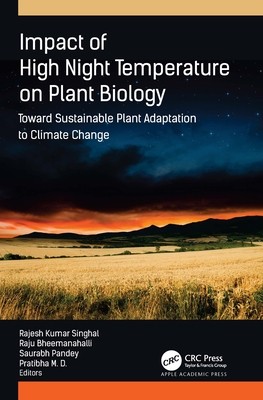
- We will send in 10–14 business days.
- Publisher: Apple Academic Press
- ISBN-10: 1774917335
- ISBN-13: 9781774917336
- Format: 15.2 x 22.9 x 1.4 cm, kieti viršeliai
- Language: English
- SAVE -10% with code: EXTRA
Impact of High Night Temperature on Plant Biology (e-book) (used book) | bookbook.eu
Reviews
Description
The persistence of higher night-time temperatures (HNT) over long periods during the crop cycle can potentially impact a wide range of growth and developmental stages. The major processes drastically affected by night-time warming, such as photosynthesis, respiration, etc., ultimately cause yield and economic losses. Despite this, HNT has not been significantly researched regarding its impact on plants. This book, Impact of High Night Temperature on Plant Biology, provides a comprehensive understanding of the physiology of night-time warming, trait responses, advanced tools for phenotyping, and alleviation and mitigation strategies.
This book discusses HNT by starting with an introduction, responsible factors, and its effect on plant growth and development and then goes on to cover the impact of HNT on plant metabolism and crucial plant processes with reproductive stage effects. The book also observes the effect of the plant growth regulator on the plant under HNT along with omics interventions to mitigate the stress effects of HNT. The book focuses on advancing technologies and approaches that involve breeding, omics, transgenics, and bioengineering of metabolic pathways in unique ways, which aim to help develop climate-resilient crops under HNT.
Key features of the book:
- Details current and future challenges of climate changes on food security in conjunction with HNT
- Highlights the effect of night-time warming on physiology, growth, and development of plants at different crop growth stages
- Explores plant processes or phenotype responses to night-time warming
- Provides an understanding of the crosstalk of night-time warming with other factors
This book is among the first books focusing on the holistic response of plants to night-time warming. The assembled research information in this book will prove an excellent resource for agriculturists, plant scientists, climatologists, and research scholars.
EXTRA 10 % discount with code: EXTRA
The promotion ends in 21d.05:52:27
The discount code is valid when purchasing from 10 €. Discounts do not stack.
- Publisher: Apple Academic Press
- ISBN-10: 1774917335
- ISBN-13: 9781774917336
- Format: 15.2 x 22.9 x 1.4 cm, kieti viršeliai
- Language: English English
The persistence of higher night-time temperatures (HNT) over long periods during the crop cycle can potentially impact a wide range of growth and developmental stages. The major processes drastically affected by night-time warming, such as photosynthesis, respiration, etc., ultimately cause yield and economic losses. Despite this, HNT has not been significantly researched regarding its impact on plants. This book, Impact of High Night Temperature on Plant Biology, provides a comprehensive understanding of the physiology of night-time warming, trait responses, advanced tools for phenotyping, and alleviation and mitigation strategies.
This book discusses HNT by starting with an introduction, responsible factors, and its effect on plant growth and development and then goes on to cover the impact of HNT on plant metabolism and crucial plant processes with reproductive stage effects. The book also observes the effect of the plant growth regulator on the plant under HNT along with omics interventions to mitigate the stress effects of HNT. The book focuses on advancing technologies and approaches that involve breeding, omics, transgenics, and bioengineering of metabolic pathways in unique ways, which aim to help develop climate-resilient crops under HNT.
Key features of the book:
- Details current and future challenges of climate changes on food security in conjunction with HNT
- Highlights the effect of night-time warming on physiology, growth, and development of plants at different crop growth stages
- Explores plant processes or phenotype responses to night-time warming
- Provides an understanding of the crosstalk of night-time warming with other factors
This book is among the first books focusing on the holistic response of plants to night-time warming. The assembled research information in this book will prove an excellent resource for agriculturists, plant scientists, climatologists, and research scholars.


Reviews